Dental implants are the best way to replace missing teeth since they promote natural mouth and jaw functioning, plus they help maintain the integrity of your jawbone. The average dental implants cost in the UK is around £2,000 per implant, and full-mouth implants can cost £25,000 or more.
In this article, we'll discuss dental implants, how long they last, whether they are available on the NHS, and everything else you need to know before making this big decision.
We'll explain the different types of dental implants and provide tips for saving money. Our aim is to provide you with all the information you need to determine if dental implants are the best solution for your restorative dental needs.
Keep reading to find out how much dental implants cost in the UK and what the implant procedure entails.
Save the trip to your NHS dentist and speak to a certified dentist right now online. Visit JustAnswer to chat online with a qualified dentist and find out all the information you need – without having to take time out for a dental appointment.
Their dentists are based in the US and are available 24/7 to help you out!
Table of contents
What do dental implants cost in the UK?
The typical tooth implant cost in the UK is around £1,850 – £3,600. However, there are many variables that will determine the cost of your individual treatment.
Dental implant prices depend on:


- The condition of your gums and existing teeth
- Your general oral health
- The current state of your jawbone
- Whether surgery such as a bone graft or sinus lift is needed
- How many teeth are being replaced, and how many implants are required
- Whether you need an implant on your upper or lower jaw, and at the front or back
- The type of implant screw and tooth replacement
- Your location
To get an idea of what dental implants will cost for you, including any additional treatments, you can use our price calculator tool:
Total estimated cost
Note that some dentists may offer cheaper implants that are not such good quality. While they present an initial saving, they usually aren't guaranteed for as long so could end up costing you more in the long run. With something as important as your teeth, the cheapest option is not always the best.
If you are interested in learning more about the average dental prices in the UK, including prices in different cities, read our full report.
Getting a quotation for dental implants near you
Your dentist may be able to give you a tooth implant cost estimate without a consultation, but won't be able to provide a final price before first examining your teeth, gums and jawbone.
Some dentists provide a complete tooth implant price with everything included, while others break it down so you can see the cost of each individual component and procedure.
When you receive a quote for dental work, be sure to check whether the following things are included or will be charged separately:


- Consultations
- Dental impressions
- X-rays
- CT scans
- Follow-up visits
- Every part of the implant (root, abutment, crown/bridge/denture)
- Temporary crowns, if needed
- All surgical procedures
Sometimes, dental implant patients need preparatory sinus lift surgery with a bone graft. This is usually the case if you have extracted your maxillary molars long ago and suffered bone loss.
The cost of this work can be anything from £200 to £2,000 in the UK, so this is something you'll have to factor in when deciding whether you can afford teeth implants.
Some clinics may lure you in with low-price dental implants, but once you add on the price of the crown, surgery and scans, it's not so cheap after all. Get several quotes from local dentists before you decide on one – you may be surprised how much they vary.
Do you need help locating a great dentist in your area that's reasonably priced for implants and other treatments? Choose your nearest city from the list below to get started:
What does a single tooth implant cost in the UK?
As a guideline, the total dental implant cost per tooth can be anything from £1,400 to £3,600 in the UK. It's often the case that front teeth implants cost slightly more than back teeth.
If multiple single implants are needed, the cost per tooth should reduce slightly since some costs (such as x-rays and scans) only apply once.
Mini implants may be as much as 60-70% cheaper than conventional implants since the materials themselves cost less and the implant procedure is more straightforward. However, they are sometimes not recommended because of their higher failure rate.
A 3- or 4-tooth bridge held in place by two implants can cost anywhere from £2,800.
How much does a full set of teeth implants cost in the UK?
If all teeth are missing, full dental implants cost £25,000 or more using traditional methods.
For a cheaper way to replace a full jaw or mouth of teeth, denture implants cost less because they require fewer implants.
All-on-4 dental implants cost from around £7,000 per arch in the UK but are available for much less if you're willing to travel overseas (more on this below).
Be aware that these costs are just starting prices; the actual cost may be much higher if you need extractions and other preparatory work, and if you opt for more expensive materials.


Is there NHS funding for teeth implants?
Due to the high cost of dental implants in the UK, it's natural to wonder whether subsidised dental implants are available on the NHS.
There is very limited funding for subsidised or free teeth implants on the NHS, and they are generally only offered to patients who need them due to circumstances beyond their control (rather than because of slack oral hygiene).
If it's simply a cosmetic preference, the answer will be ‘no'. We have a separate page detailing the full NHS dental implant criteria and how to apply.
If you're not eligible, you should still be able to get dentures or a dental bridge through your NHS dentist, and if you decide to pay for teeth implants privately, you might be able to get other parts of your treatment as an NHS patient.
For instance, if you need to have damaged teeth removed before dental implant surgery, this might be covered by the NHS. In England, tooth extraction is charged at the Band 2 rate of £70.70 per treatment (not per tooth).
It's always worth checking whether you can have separate work done with an NHS dentist before switching to private work. Many dentists do both NHS and private work, so will be able to advise you on this.
Ways to save on dental implants
The best way to save money on dental implants is simply to shop around. The table below shows what a difference in price there is between different towns and cities in the UK, for example.
Ranking | Town/City | Average cost of Implant as of 2014 |
The top five most expensive places in the country to get implants | ||
1 | Plymouth | £2,733 |
2 | Bedford | £2,484 |
3 | Weston Super Mare | £2,400 |
4 | Harrogate | £2,333 |
5 | Winchester | £2,300 |
The top five places in the country to get cheap implants | ||
1 | Oxford | £1,150 |
2 | London | £1,200 |
3 | Guilford | £1,225 |
4 | Halifax | £1,295 |
5 | Wolverhampton | £1,340 |
UK AVERAGE PRICE : £2,000 | ||
(Source: whatclinic.com – 2014)
As well as researching the price of dental implants near you, consider broadening your search to nearby towns and cities. It may be worth travelling an extra half an hour for treatment if it means saving hundreds of pounds.
As a general rule, dental implant costs in urban areas will be cheaper than in cities, in line with property and rental prices. Where there is competition between several dentists in one place, this should help keep prices lower.
You can read our full article on cheap dental implants or our guide to the cheapest place for All-on-4s for more tips, including getting treatment at a dental school. There are also some possibilities for free dental implants, although in reality, very few people are able to get their treatment for no cost at all.
Implants are the answer to the problem of missing teeth. If a patient is missing one or more teeth, it can become more than just a cosmetic inconvenience. There are many practical negative consequences to missing teeth, which all have to do with your dental health and how you live. With teeth gone, eating and talking can become difficult and you can lose your jaw’s structure.
The cost of implants varies on the severity of your condition and what your gums, existing teeth, and jaw are currently like. However, your dental health, and your ability to do things like sing in the car with your kids or eat your favourite meal, are all at stake when you have missing teeth. To me, that makes dental implants worth the cost.
Dr. Kevin Varley, Stonebrook Family Dental
Does dental insurance cover teeth implants?


You might consider taking out a dental insurance plan if you think you will soon need teeth implants.
Insurance policies can cover anywhere from 50% to 70% of the cost of replacement teeth, although it can be a lot lower and some don't cover implants at all, so read the small print carefully.
Most policies have an annual payout limit which is below the average cost of a tooth implant in the UK. There is also usually a waiting period of six months to a year before you'll be covered for implants, and other restrictions and exclusions may apply.
Denplan is one insurer that does provide optional dental implant cover. However, this only applies to implants needed as the result of an injury and there is a limit of £2,100 per implant. It also won't cover pre-existing conditions, so if you already need a dental implant, this isn't going to help.
Dental implant financing
If you can't afford to pay the cost of dental implants in full up-front, ask your dentist about payment plans. Most clinics have ways to help patients spread the cost of treatment.
Dental payment plans usually require you to pay a percentage of the cost when you start treatment, with the remainder split into monthly payments. If possible, find a dental implant payment plan with 0% interest.
Alternatively, you could take out a personal loan to fund your dental work. Again, research your options so you understand what you're signing up for and get the best deal possible.
How much are dental implants abroad?
With the cost of private dentistry in the UK so high, many people look further afield for affordable dental implants.
Patients can save as much as 70% on implants and other dental treatments by travelling abroad, a trend which has become known as ‘dental tourism'.


European countries such as Hungary, Poland, Turkey and Spain are popular destinations for low-cost teeth implants close to the UK. There is also the option to combine the trip with a holiday in more exotic locations in Southeast Asia or South America.
Even taking into account the price of flights and accommodation, these trips can easily work out cheaper than the cost of dental implants alone back home.
You might worry that lower teeth implant prices mean lower standards, but in fact the opposite is often true.
In destinations that have become popular for dental tourism, dentists have invested heavily in modern, state-of-the-art equipment.
There is also a much stronger emphasis on good service and making the experience comfortable and enjoyable. Some clinics go as far as to provide patients with a luxury spa experience during their stay.
Hungary, in particular, has developed a reputation for highly skilled dentists whose clinics specialise in treating patients who have travelled from other countries for dental care. The capital, Budapest, is just 2 ½ hours by plane from the UK and many low-cost airlines fly there.
Since most treatments will require an overnight stay, patients can also enjoy the sightseeing opportunities the city has to offer.
Comparing teeth implant costs abroad
If you are considering travelling from the UK to save on dental implants, Hungary is just one of the countries worth considering. The following table gives information about flights and approximate treatment costs in some of the most popular locations for dentistry in Europe:
Destination | Travel to | Flight time from London | Example flight cost (return) | Average cost for implant & crown |
Poland | Warsaw | 2 hours 20 mins | £50 | £1,030 |
Hungary | Budapest | 2 hours 30 mins | £55 | £1,205 |
Czech Republic | Prague | 1 hour 45 mins | £54 | £990 |
Turkey | Istanbul | 3 hours 50 minutes | £150 | £845 |
Spain | Madrid | 2 hours 25 mins | £44 | £1,450 |
Prices don't include medical insurance or accommodation costs; the average price for an implant in the UK is £2,000.
Traditional implant treatment requires several visits over a number of months. Making this many trips does cause some inconvenience with time off work, amongst other things. Because of this, overseas clinics commonly offer single-visit implant options such as mini implants and All-on-4 implants (also called ‘teeth in a day').
Before committing to any dental treatment abroad you should first:
- Choose a dentist you feel comfortable communicating with
- Read online reviews of that dentist and clinic from people who have had treatment there
- Check the governing bodies for dentistry in that country
- Request and verify your chosen dentist's qualifications and experience
- Ask how long you will need to stay for treatment and recovery, and how many trips will be required
- Understand exactly what is and isn't covered in the price you have been quoted
- Calculate the total cost of all trips and treatment and compare this to treatment at your local dentist
- Speak to your regular dentist to get advice and find out about aftercare
Are you interested to know how much tooth implants cost abroad and what you could save by travelling for dental work? Our full guide to getting cheaper dental implants abroad has more information about costs and the best countries to visit.
But, you can request a quote from reputable clinics right away using Dentaly Go's dental tourism service. They have already hand-picked clinics in different countries that meet their strict quality criteria. Fill in a few details below and one of their representatives will be in touch to arrange a free quote for you.
We look forward to being able to help you save up to 70% on the dental care you need!
What are dental implants?
A dental implant is a screw-like artificial tooth root that is surgically inserted into the jawbone. It is used to hold a prosthetic tooth, a series of teeth, or a prosthesis in place. In this way, dental implants function in a similar way to a natural tooth root, but you can think of them as screw-in teeth.
Many people use the term ‘implant' to mean the entire replacement tooth, but it actually only refers to the part inserted into the bone. The ‘tooth' part is called a crown, and an abutment connects these two parts.
Teeth implants may be used in cases where the patient has lost one or more of their teeth. This could be due to various reasons such as a dental abscess, accident or other dental and medical conditions.
Other people choose to have implants for purely cosmetic reasons. In the UK, 47% of people have between one and five fillings or implants.
The result is artificial teeth that look, feel and function just like natural teeth.
Are you looking for a great dentist to provide dental implants near you? Simply select your nearest city below and read about our hand-picked recommended clinics in your area:
Who can have teeth implants?
Not everyone is a good candidate. In order to be a good candidate for a dental implant, the patient should have healthy gums and sufficient jawbone that is capable of supporting the new implant.
Patients who have underlying oral health problems like gum disease, or who have experienced bone loss, may not be suitable for dental implant surgery.
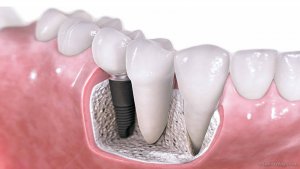

However, in many cases, it's possible to carry out a dental bone graft surgery to strengthen the jawbone before dental implants are inserted.
One alternative for patients who can't have conventional implants is mini dental implants. These are similar in structure to their larger counterparts but have a thinner root about the width of a toothpick. This means that less bone is needed to hold them in place.
If you have been told you can't have implants because you have suffered jawbone loss or your bone density is too low, mini implants may still be an option. An added benefit is they can usually be fitted in a single visit – no need to wait 3-6 months for the implant to settle.
Mini implants generally cost much less than regular ones, but they do have certain drawbacks. Read more in our guide to mini dental implants. In some cases, it is too late for dental implants, so you'll need to consider alternatives, which we'll talk more about below.
Dental implants are a fantastic choice and an ideal selection when replacing a missing tooth or teeth. Providing the patient the ability to enjoy proper chewing and oral function – along with preserving the facial muscles – dental implants also ensure a patient smiles with ease and confidence.
The dental implant process requires two phases: a surgical phase and a restorative phase. Regarding the surgical phase, patients should be mindful of working with a surgeon who is well-experienced, and equipped with an abundance of training in the discipline.
If an implant is poorly or incorrectly placed it could potentially lead to permanent nerve damage, infection and more.
It's also important to ensure patients' dental implants are high quality, as there's a great benefit to working with an implant that is medically approved and research-backed to mitigate any adverse reactions during both the surgery and recovery phases of the procedure.
Dr Igal Elyassi, Wilshire Smile Studio
Types of dental implants and tooth reconstruction
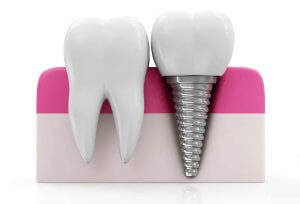

When it comes to the implant itself, there are two main types:
- The first is the endosteal implant. These are inserted directly into the jawbone and hold one or more artificial teeth in place via abutments. They look like small screws, either tapered or cylindrical.
- The other is the subperiosteal implant. This tooth implant has a metal base which is fitted under the gum tissue but above or on the jawbone. The artificial teeth are fitted in the same way, as supports which protrude from the gums. This type is very uncommon and is custom-made for patients with extremely shallow jawbones that won't support traditional endosteal implants.
The following animation shows the different components of an endosteal implant being placed:
Dental implant materials
There are different materials that can be used for the part of the implant inserted into your jawbone, which functions like a tooth root.
Titanium implants are most commonly used and are considered the best dental implants by many dental surgeons. This metal is incredibly strong and is biocompatible with your jawbone, meaning there should be no adverse reaction and the bone naturally grows around it over time. The implants are not made from pure titanium as this is too soft; instead, various alloys have been developed.
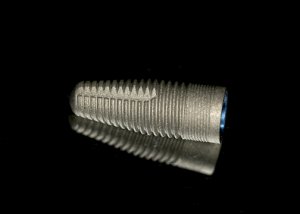

For people who don't like the idea of having metal implanted in their bodies, various ceramics and polymers are available. By far the most common alternative to titanium is zirconia implants. Although this material contains traces of metal, it is classed as a ceramic.
So how do you decide which is best for you?
Because titanium has been used in dental implants for much longer than zirconia, more studies have been conducted to demonstrate its safety, effectiveness and longevity. Many dentists, therefore, feel more comfortable recommending titanium.
There is also the matter of versatility. Titanium implants come in two parts: the implant and the abutment. Because the abutment is fitted separately, there is some flexibility to adjust the position of the crown placed on top.
The majority of zirconia dental implants, on the other hand, usually don't have a separate abutment (except for one brand that offers a two-piece zirconia implant).
Some studies suggest that zirconia, although extremely strong, is more susceptible to material flaws than titanium. Pores and microcracks in the material can cause the material to fracture, meaning zirconia implants have a slightly higher failure rate.
Finally, titanium dental implants are typically less expensive than zirconia. All of these factors point towards titanium as the best dental implant material, unless you particularly want to avoid metal or you know you are allergic to any of the metals used in titanium alloys. Still, you can discuss the options with your dentist and ask for their advice if you have any concerns.
Dentures vs. dental bridges vs. teeth implants
Remembering that an ‘implant' is simply the artificial root inserted to hold replacement teeth in place, we can now turn our attention to the different types of replacement teeth available.
The terminology can get a little confusing here since one word can refer to different things.
When a single tooth needs to be replaced, the implant will be fitted with an individual crown. This is different to the type of crown used to repair a broken tooth. The non-implant prosthetic alternative is a bridge that affixes to the two adjacent teeth and fills the gap.
The downside of a traditional bridge is it requires healthy teeth to be shaved down.
Where two or more teeth in a row are missing, an implant bridge may be used. Rather than inserting one implant screw for each tooth, just two implants can be used to support a row of three or four artificial teeth fused together.
You can find out more about dental bridge vs implant treatment.
Here you can see an animation which shows how a three-tooth bridge is fitted using two dental implants:
Denture implants
If all the teeth in the jaw need to be replaced, denture implants may be the solution. These consist of a full set of acrylic or ceramic teeth attached to a gum-coloured acrylic base.
Unlike traditional dentures that sit on the gum and are affixed with an adhesive, implant-retained dentures clip onto fixed abutments and are much more sturdy.
Denture implants tend to present fewer problems with eating and speech than traditional dentures. There is also no risk of them slipping out of place in the middle of a conversation or a meal.
Other benefits of dental implants are they can help stabilise and preserve the jaw bone, prevent greater bone loss and maintain the natural shape of the jawline. If the jaw bone has no tooth root or implant to support it it may recede, causing the face to sag.
Although single-tooth implants and denture implants cost more up-front than conventional alternatives in the UK, they can be more cost-effective in the long run since they are designed to be much longer-lasting.
Our guide to missing teeth treatment options has more information about each of these solutions.
Full-mouth dental implants
Patients who have lost all their teeth may also consider full mouth implants, also known as all-on-4 implants. Unlike implant-retained dentures, these are permanently fixed in place. Many people prefer the idea of having fixed teeth rather than ones they have to remove for cleaning.
It's usually not necessary to insert an individual root for each tooth since a single implant root is strong enough to support several teeth if it's placed well.
Solutions such as full mouth implants allow a full set of teeth to be placed using four implants for the lower jaw. The upper jaw requires four to six since the bone density is lower. The posterior implants are angled at 30 or 45 degrees to give them a stronger hold.
This is a cheaper option than traditional implant technology which would require 8-10 implants in each jaw. Note that this type of tooth implant is only available in titanium since zirconia implants can't be placed at such a sharp angle.
An added benefit of All-on-4 implants is the entire surgery is usually completed within a day, so you won't need to make as many visits to the dentist. This is what gives them the nickname ‘teeth in a day'.
Dental implant procedure step by step
Implant dentistry, or ‘implantology', involves several stages. The work can be carried out by a dentist with the adequate advanced training, a periodontist, a prosthodontist, or an oral surgeon.
Note that there are many variations on the procedure described below, and some steps may be completed at the same time or on a different timeline. You can read this dental implant experience account for a better idea of what each stage feels like.
We're going to talk about the different stages below — but if you'd like to speak directly with a dentist, you can go to JustAnswer and chat online with a qualified dentist and find out all the information you need – without having to take time out for a dental appointment. Their dentists are based in the US and are available 24/7 to help you out.
Preparation
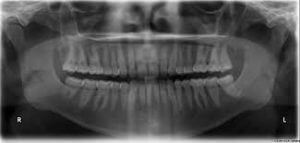

Before the operation, a meticulous examination ought to be carried out. Your dentist will review the nerves, sinuses and bone structure around the area to be treated. This usually involves an x-ray of your jaw, but other scans may be required.
A cone beam computed tomography (CBCT) scan is the most accurate type of radiography available – this will let your dental surgeon assess the current state of your jawbone and oral structure.
Your teeth and gums will be examined and any related problems will be treated before the dental implant surgery is carried out.
Patients who have low bone density or a damaged jawbone may need a bone graft before implants to strengthen the jaw. This involves the use of commercially available graft materials from natural or synthetic origins that stimulate or accelerate bone growth.
In advanced cases of bone loss, surgery is performed to remove bone from another part of the body and insert it where the dental implant is to be placed. Bone is often taken from a different part of the jaw, but may come from the shin or hip. Alternatively, synthetic materials can be used.
Having a bone graft delays the tooth implant procedure considerably since it can be anywhere from three months to a year before the bone can support an implant.
Another thing that can prolong the process is extraction. If you need to have a damaged or decayed tooth removed in preparation for the implant, you'll usually have to wait a month or two between these steps. In some cases, however, it's possible to extract a tooth and screw in the tooth implant on the same day in a process called immediate implant placement.
Placing the dental implant
The placement of implants in the jawbone is classed as an outpatient procedure, which means no overnight hospital stay is needed. It can take place at your dentist's surgery, usually with a local anaesthetic. Nervous patients can usually request IV sedation dentistry to make the procedure less stressful.
Your dentist will advise you on what's best according to the number of implant teeth planned, the complexity of the operation, and your anxiety level.
The procedure itself consists of several steps. The first step is to make an incision in the gum to expose the bone. Next, a hole is drilled where the tooth implant is to be placed in the jaw. Then, the implant itself is screwed into place.
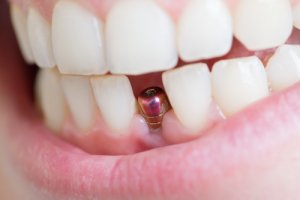

This is, understandably, a difficult procedure with little room for error. Dentists must undergo specialist training so they know exactly where and how to place the dental implant to make it last as long as possible.
Once the dental implant is in place, a healing cap may be placed on top of it. This serves the dual purpose of protecting the implant site and promoting the growth of soft tissue. However, it is not aesthetically ideal when used on front teeth implants.
Alternatively, the gum can be stitched or secured over the implant to protect the area from debris and infection. The implant site will be sore for a few days after this and special care must be taken with cleaning, eating and drinking.
During the complete healing process, which can take from four to six months, the implant fuses with the bone – a process called osseointegration. This is why dental implants use materials such as titanium which are biocompatible with our bodies.
Installing the abutment
Once ossesointegration is complete, the abutment is installed. This is an extension that protrudes from the gums and connects the replacement tooth, or crown, to the implant.
The gum above the implant has to be opened up again to place this abutment, unless a temporary cover was placed over the implant at the first stage. Again, this procedure is an outpatient operation that only needs a local anaesthetic. Once the abutment is in place the gum is closed around it, but not covering it this time.
In some cases it's possible to put in both the implant and the abutment during the same surgery. No long-term negative effects have been reported from doing this, as long as the area has sufficient time to heal.
Your dentist may be able to provide you with an immediate temporary denture or bridge to wear while the gum tissue around the abutment heals. This avoids the awkwardness of people seeing you with metal stumps poking out where your teeth should be.
Around 2 weeks later the gum tissue should be completely healed. This marks the end of the surgery, and it's time to get the crowns made.
Fitting the crown
Once your mouth has recovered fully, you'll visit the dentist again to begin the process of making your crown. Your dentist might need to modify the abutment before taking the impressions.
These are then sent to the laboratory for the construction of the crown/bridge. Some dentists have special milling machines at their clinics which enables them to fabricate the restoration during your visit.
The colour of the crown will be matched to the surrounding teeth to make it look as natural as possible. This is especially important with front tooth implants and cosmetic dental implants.
A lot of work goes into planning, creating and placing dental implants. In the following video, a dentist explains some of what goes on behind the scenes, and in the chair, as part of the tooth implant procedure:
Once ready, the crown is attached to the abutment. The crown could be either screw-retained or cement-retained to the abutment. In other words, the crown could be fixed to the abutment using a screw or cemented onto it.
Composite fills the hole which was used to tighten the screw inside the crown in case of the screw-retained restoration.
Dentures and some bridges use a clip-on abutment which allows them to be removed for cleaning. Single-tooth implants and other types of prostheses are fixed in place permanently.
Dental implant recovery
After each stage of the tooth implant process your body will take time to recover. It's common to experience some discomfort during this recovery time, including:
- Swollen gums and/or face
- Bruised gums and skin
- Pain around the implant area
- Slight bleeding


Most dental surgeons now use stitches that dissolve by themselves as the wound heals. If you don't get self-dissolving stitches, you'll need to make another trip to have them removed.
The above symptoms should all lessen in the days following your treatment. If you notice swelling, pain or bleeding getting worse, you should contact your dentist straight away. It may be that you need antibiotics or stronger painkillers.
Dentists will usually advise that you eat on the opposite side of your mouth or avoid certain hard or chewy foods for a few days after each surgery, to allow time for your teeth implants to settle.
You'll need to visit your dentist more often than usual so he or she can check your progress.
Once the process is complete and you have recovered fully, you'll be able to eat normally. Implant teeth are usually just as strong as natural teeth. However, it's of utmost importance that you brush and floss every day to keep your gums, implants, and remaining natural teeth healthy.
If you have trouble using regular string floss, an oral irrigator (water flosser) can help you gently clean around any teeth implants you have.
Are teeth implants right for me?
It's understandable that you may be unsure whether dental implants are the best option for you – especially considering the costs involved. Your dentist will be able to answer a lot of your questions, but there are other ways to get information to help you decide.


If you have any friends, family or colleagues who have had teeth implants, ask them if they have any advice or recommendations. You may be surprised to find out how many people have had the procedure.
You can also read about other people's experiences (both with a particular dentist and with implants in general) by checking dental implant reviews online.
Don't be shy about questioning potential dentists – you're spending a lot with them, after all! In particular, ask to see some photos of dental implants before and after from previous clients, so you can judge how natural they look.
You'll probably feel more comfortable choosing a dentist who has extensive experience with implant dentistry, although this may come at a premium.
You can also read our guide on the pros and cons of dental implants to help you with your decision.
Dental implants should be thought of as just that: an investment. Unlike other traditional dental restorations like crowns, bridges, root canals, and fillings, implants can offer a permanent solution when placed and cared for appropriately. Salvage procedures for natural teeth all have a shelf-life.
As the number of treatments on the tooth increases, the work required to treat it becomes more expensive, and the cumulative cost can far exceed the cost of a dental implant.
Because dental implants are a long-term, specialized solution, the implant procedure is also more complex and requires a highly-trained specialist. Oral and maxillofacial surgeons undergo extensive training beyond dental school and are the most qualified oral health care providers to perform dental implant surgery.
I believe it is our responsibility as dental professionals to provide patients with choices. Ensure that you understand each of the options presented and assess the risks, benefits, and alternatives to ensure you are making educated decisions for yourself.
– Dr. Paul Koshgerian
Advantages of teeth implants
We can sum up the advantages of tooth implants as follows:
- A permanent, long-lasting solution to tooth loss
- Stable and durable
- Can't be misplaced since they aren't removable
- No issues with speech
- Allow normal eating
- Look and feel like natural teeth
- No adhesives or special cleaning required
- Don't affect adjacent healthy teeth
- The success rate of around 95% after 10 years
Possible dental implant problems
There are some drawbacks to having teeth implants, of course. It's important to be aware of these before deciding to go ahead with any surgery:


- Some people may not feel comfortable with the invasive surgery involved
- Some pain and swelling are expected after surgery
- There is a slight risk of infection following surgery
- It's possible for implants to damage nerves and sinuses
- Patients who don't maintain good oral health may experience complications
- Reduced sensitivity when biting, increasing the risk of excessive biting force
- Although a long-term solution, they may need to be replaced after a decade or so.
The only other thing that may be holding you back is the cost of dental implants. Although a high initial investment, implants can prove less expensive in the long run than alternatives such as dentures and bridges. This is because teeth implants are designed to be long-lasting and are less likely to get damaged or become uncomfortable.
Below is a table that sums up much of the information in this article so you can easily compare dental implants with other options you may be considering.
Treatment | Implants | Bridges (fixed to adjacent teeth) | Traditional dentures | None (don't replace missing teeth) |
Cost | High - the most expensive tooth replacement option | Cheaper solution to fill a single or double tooth gap | Cheaper solution to replace a full arch of teeth | Free |
Longevity | Designed to be long-lasting (at least 10 years); possible to last a lifetime if maintained well | 5-15 years, possibly longer | 5-10 years | - |
Comfort | Like natural teeth | Not noticeable if fitted properly | Become less comfortable as the mouth naturally changes shape; require adhesive to stay in place | Eating may be uncomfortable; risk of gum disease |
Procedure | Jawbone surgery, multiple visits over several months (for conventional implants) | Requires removal of enamel on adjacent teeth | Any existing teeth must be removed | None |
Appearance | Like natural teeth | Like natural teeth | May look artificial | Gap in teeth, obvious if at the front |
Risks | Can become infected; small chance or rejection or complications | Bone and adjacent teeth may deteriorate over time | Can be lost; cause mouth sores if ill-fitting; may slip while being worn | Jawbone and surrounding teeth at risk of deterioration; may cause problems eating or speaking |
Conclusion
There's no denying that the cost of dental implants in the UK – and even in ‘cheaper' overseas destinations – is significant. The question you have to ask yourself is, “How much are teeth implants worth to me?”.
Most dentists will agree that the best way to replace missing teeth is with implants if your jaw structure can support them. They are longer-lasting than dentures or bridges and present fewer long-term complication risks.
Having a confident smile can make a big difference to people in their careers, their love lives and their social lives. You might therefore view implants as an investment in your well-being for many years to come.
Before committing to any surgery, be sure to shop around to find a competitive dental implant price in your area. Don't be afraid to ask your dentist plenty of questions so you understand the procedure. You can check dental implant reviews online to find out more about what the procedure involves and what it's like living with implant teeth.
If you're open to the idea of getting dental implants abroad, this may well be the most affordable solution.


FAQs
Are dental implants safe?
Yes, absolutely. Although there are some risks to keep in mind, screw-in teeth implants are widely regarded as a safe dental restoration with a well-established history of success.
How long do dental implants last?
Barring any complications, dental implants should last at least 10 years and probably much longer. Current teeth implant survival rates are 95.4% after 10 years.
Do dental implants hurt?
The placement of the implant itself is done under local or general anaesthetic, so it shouldn't be painful. But, some discomfort is normal in the days after as you recover.
How long does the dental implant process take?
Traditional teeth implants are fitted over the course of almost a year. It takes four to six months just for the implant to fuse with your jaw bone, after which time the abutment and crown are fitted.
What should I expect after tooth implant surgery?
It's normal to experience some soreness, bruising, swelling and/or light bleeding immediately after having a tooth implant placed. Your dentist will give you medication to help manage any pain.
What can I eat after dental implant surgery?
It's likely your dentist will tell you to restrict what you eat after dental implant surgery while the implant site recovers. Smooth soups, fruit juices and smoothies will help you in your recovery.
Do you have questions about dental treatment? Visit JustAnswer to chat online with a qualified dentist and find out all the information you need – without having to take time out for a dental appointment. Their dentists are based in the US but are available 24/7 to help you out.
UCLH – University College London Hospitals NHS Foundation Trust: Dental Implants – General Information. Consulted 25th April 2023.
Guy's and St Thomas' NHS Foundation Trust: Dental Implants. Consulted 25th April 2023.
National Center for Biotechnology Information: A Critical Review of Dental Implant Materials with an Emphasis on Titanium versus Zirconia. Consulted 25th April 2023.
British Academy of Dental Implantology BADI: Implant Treatments. Consulted 25th April 2023.
Dentistry.co.uk: Risk factors of dental implant failure. Consulted 25th April 2023.
International Journal of Implant Dentistry: Potential risk factors for early and late dental implant failure: a retrospective clinical study on 9080 implants. Consulted 25th April 2023.
Sunstar: Global Healthy Thinking Report 2021. Consulted 25th April 2023.





